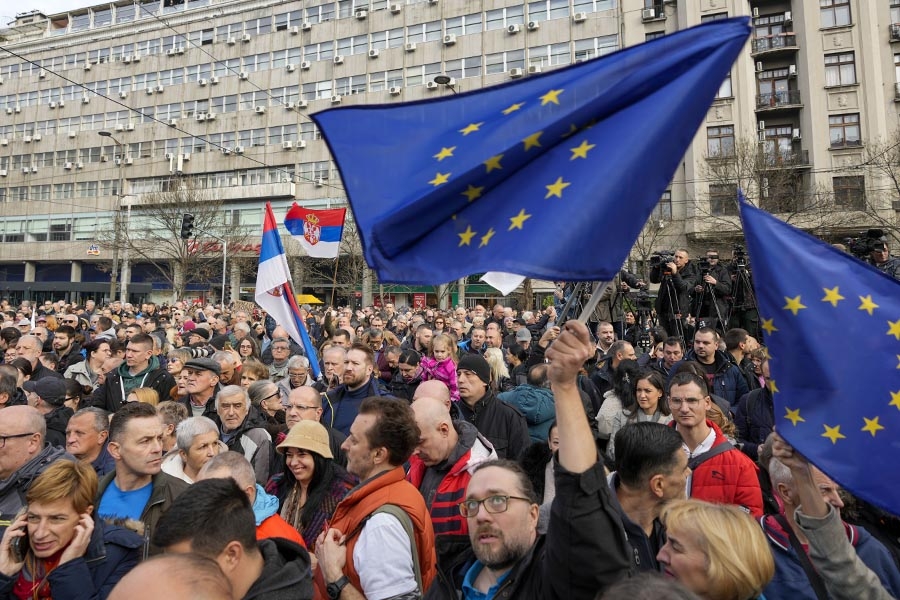Brussels and European major capitals must make it very clear that a country where impartial international observers have reported so many forgeries, unfair election campaigns and even physical attacks during elections cannot have a credible chance of joining the EU family, the independent German Academic told Demostat
The OSCE has become a very weak institution, although it remains a reliable source of election observation information. Of course, there will be informal negotiations with Belgrade, but I still see only the EU perspective as the only possible leverage

Brussels and European major capitals must make it very clear that a country where impartial international observers have reported so many forgeries, unfair election campaigns and even physical attacks during elections cannot have a credible chance of joining the EU family, the independent German Academic told Demostat
The OSCE has become a very weak institution, although it remains a reliable source of election observation information. Of course, there will be informal negotiations with Belgrade, but I still see only the EU perspective as the only possible leverage

To be honest, I have no idea how the current difficult internal situation in Serbia can be resolved. The regime, namely Vucic, will not meet the demands of the protesting citizens, and those who protest have no ability to force the ruling structures to move in the direction of more democratic, transparent behavior, says Franz-Lothar Altmann, an independent German Academic and Professor of International Relations at the University of Bucharest.
Speaking about the political crisis in our country, that has started after the December 17th elections, Altmann notes: ”However, if the demonstrations continue and the regime responds with repressive actions, then at least serious conflicts and even street fights can arise in Belgrade, but this will not lead to substantive changes, but to the worst”.
Regarding Demostats conclusions that, given the atmosphere in society, there are no conditions for direct dialogue between the authorities and the opposition, which is why international mediation is needed, our interlocutor points out: ”As an external observer with limited internal information, I also see no signs of constructive dialogue between the regime and protesting citizens”.
According to Altmann, “Vu?i? will not accept mediation from the outside, and this could only be mediation by the West, but will repeat his claims that Western interests fueled the protests”.

-The only leverage that remains is the perspective of the European Union, and here Brussels and the major European capitals have to make it very clear that a country where impartial international observers have reported so many forgeries, unfair election campaigns and even physical attacks during elections, cannot have a credible chance of joining the EU family. Here too, Vucic will play the Russian and Chinese cards again, because he knows that the main EU countries still consider Serbia the most important country in the Western Balkans. And if the international community, that is, Western countries, try to support the citizens who are protesting, Vucic will use it as another argument that the West organized everything, says the interlocutor of Demostat.
Asked how international mediation could be organised and whether the OSCE should be involved in such a process, Altmann said: ”Again, I am quite skeptical of the mediation of the international community. The OSCE has become a very weak institution, although it remains a reliable source of election observation information. Of course, there will be informal negotiations with Belgrade, but I still see only the view of the European Union as the only possible leverage of influence”.
Commenting on the claims of the Serbian authorities that Western states interfered in the electoral process and that the Russian security services presented them with evidence that riots were being prepared after the elections, Altmann points out: ”Who transported people from Republika Srpska to Belgrade on buses to participate in the elections there, because the regime was afraid of losing the capital? Western institutions to influence elections? What nonsense! On the other hand, it is quite logical that Russia is interested in keeping Serbia away from the West, and accusations of alleged Western organization of unrest in Belgrade are exactly what one would expect”.
The interlocutor of Demostat concluded: “If Vucic feels pressure from the West due to obvious electoral falsifications, then his only way out is to rely on Moscows support. That is why Moscow must accuse the West of unrest in order to bring Belgrade closer to itself”.
In all societies there are issues that are rather being skipped. Certain...
The neoliberal path, started in 2001, has led to especially bad results in Serbi...
For centuries, the region was subsumed within the Ottoman and Hungarian Empires,...
"Serbia has returned to the systemic and anti-systemic position of the political...
In reality, Serbia is closer than ever to NATO. In the course of the last five y...